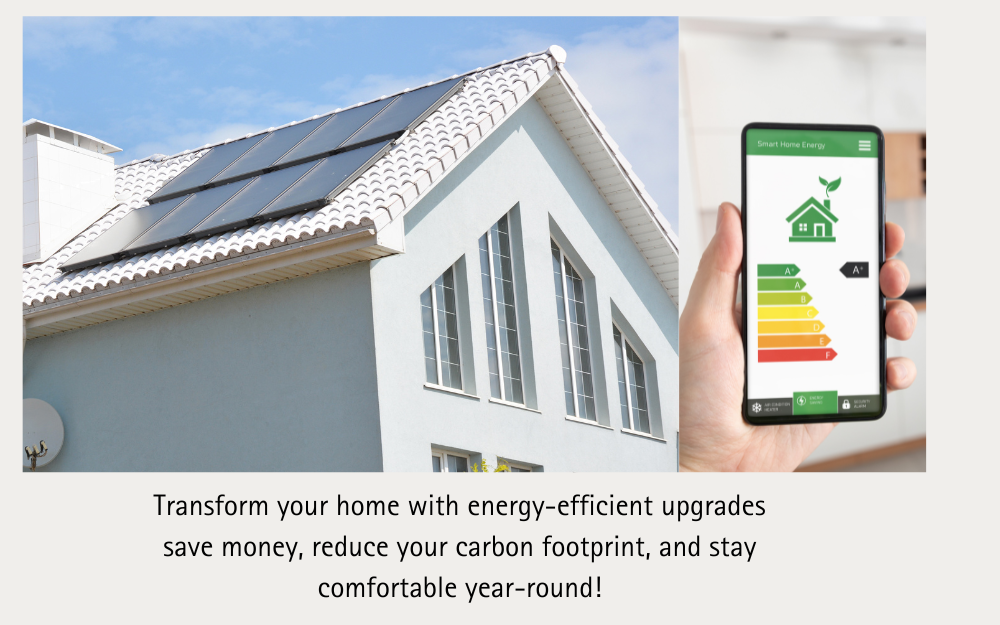
Energy-Efficient Home Upgrades: A Smart Choice for Savings and Sustainability
As energy costs continue to rise and environmental concerns take center stage, homeowners are increasingly seeking ways to reduce their carbon footprint while cutting down on energy bills. Energy-efficient home upgrades have become one of the top trends in home remodeling, providing a win-win scenario—saving money while helping the planet.
In this blog, we’ll explore why energy-efficient upgrades are trending and highlight some of the most popular options to consider for your home.
Why It’s Trending
The push for energy-efficient homes has grown significantly in recent years. Rising energy costs are a major concern for homeowners, prompting many to seek alternative solutions that allow them to save on utility bills. At the same time, people are becoming more eco-conscious, wanting to minimize their environmental impact and make choices that contribute to a sustainable future.
Energy-efficient upgrades not only address these concerns but also offer long-term benefits, including increased home value, improved comfort, and a reduction in energy consumption. Whether you’re looking to go green, save on utility bills, or increase the resale value of your home, energy-efficient solutions are a smart investment.
Popular Energy-Efficient Upgrades
1. Solar Panels to Reduce Electricity Costs
Solar panels have become one of the most popular energy-efficient upgrades in recent years. By harnessing the power of the sun, solar panels generate electricity that can be used to power your home, significantly reducing your reliance on the grid. Not only do solar panels help you cut electricity costs, but they also provide a clean, renewable energy source that contributes to reducing your carbon footprint.
The installation of solar panels can also increase the value of your home, as more buyers are looking for homes with energy-efficient features. With tax credits and incentives available, the upfront cost of installing solar panels has become more affordable, making this a worthwhile investment.
2. Energy-Efficient HVAC Systems and Smart Thermostats
Heating and cooling make up a significant portion of your home’s energy usage, and upgrading to an energy-efficient HVAC system can yield significant savings. Newer HVAC systems are designed to consume less energy while providing better temperature regulation, ensuring that your home remains comfortable year-round.
Additionally, smart thermostats have revolutionized how homeowners manage their energy usage. These thermostats can learn your schedule, adjust the temperature automatically, and be controlled remotely via smartphone. This means no more wasting energy when you’re not at home or when you’re asleep. Smart thermostats help you optimize heating and cooling, leading to lower energy consumption and reduced utility bills.
3. Tankless Water Heaters for On-Demand Hot Water
Traditional water heaters continuously heat and store large quantities of water, leading to wasted energy. In contrast, tankless water heaters heat water on demand, only when you need it, making them much more energy-efficient. Since there’s no standby energy loss, you can expect to see significant savings on your utility bills.
Tankless water heaters also provide a continuous supply of hot water, making them ideal for large families or homes with high water demands. Plus, they take up less space than traditional water heaters, freeing up room in your home.
4. High-Performance Insulation for Better Temperature Regulation
Proper insulation is one of the most effective ways to maintain a comfortable home environment while reducing energy consumption. High-performance insulation helps keep your home warm in the winter and cool in the summer by preventing heat from escaping or entering your home.
Upgrading insulation in key areas like the attic, walls, and floors can significantly improve your home’s energy efficiency. Not only does this help reduce heating and cooling costs, but it also enhances your home’s comfort and reduces your carbon footprint. Energy-efficient windows and doors can also help improve insulation by minimizing drafts and heat loss.
Why Energy-Efficient Home Upgrades Matter
The benefits of energy-efficient upgrades extend far beyond just lower utility bills. Investing in these upgrades can increase the value of your home, as more buyers are seeking energy-efficient homes. In addition, energy-efficient homes are more comfortable, as they provide better temperature regulation and indoor air quality.
Another key benefit is the positive impact on the environment. By reducing energy consumption and utilizing renewable energy sources, such as solar power, you can contribute to lowering your home’s carbon footprint and help combat climate change. For many homeowners, this sense of environmental responsibility is just as important as the financial savings.
Conclusion
Energy-efficient home upgrades are no longer just a trend—they are a necessity in today’s world. With rising energy costs and a growing focus on sustainability, homeowners are embracing upgrades that reduce energy consumption, save money, and increase comfort. Whether you’re installing solar panels, upgrading your HVAC system, or investing in better insulation, these upgrades will not only improve your home but also provide long-term benefits that contribute to a greener, more energy-efficient future.

No Comments
Sorry, the comment form is closed at this time.